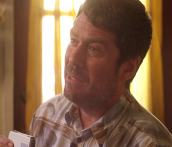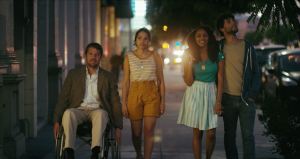I LOVE BEKKA & LUCY is a short-form series from creator/director Rachael Holder, now streaming its eleven-episode first season on the Warner Bros. site Stage 13. While I LOVE BEKKA & LUCY focuses on the friendship between the title characters, played by Jessica Parker Kennedy and Tanisha Long, Alexis Denisof has earned an Emmy nomination for Outstanding Actor in a Short Form Comedy or Drama Series as their neighbor Glenn.
Lonely and awkward, Glenn desperately wants to make friends and achieves an unlikely connection with the initially very resistant Bekka (meanwhile, Lucy contends with her own issues with her own boyfriend). Glenn also has a spinal cord injury, which means he uses a wheelchair.
Glenn is a new type of character for Denisof, who is known for a wide variety of film and television roles. He has worked often with Joss Whedon, guest-starring on BUFFY THE VAMPIRE SLAYER and then moving over to that series’ spinoff ANGEL as a series regular as Wesley Wyndam-Pryce, who starts out as a comedic figure and evolves into a tragic hero. Denisof has also appeared in Whedon’s DOLLHOUSE and THE AVENGERS, and starred in Whedon’s film adaptation of William Shakespeare’s MUCH ADO ABOUT NOTHING. Denisof also starred in the YouTube series H+, had an arc on GRIMM, and played the recurring role of airhead newscaster Sandy Rivers on HOW I MET YOUR MOTHER, which starred Denisof’s wife Alyson Hannigan.
In a phone interview, Denisof – born in Maryland, raised in Seattle, and trained in London, England – discusses his Emmy nomination, playing a paraplegic, and much more.
ASSIGNMENT X: Did you know the Outstanding actor in a Short Form Series Emmy category existed before you got nominated?
ALEXIS DENISOF: No, I did not, but I’ll take it.
AX: Is being an Emmy nominee having any kind of effect on you?
DENISOF: Oh, I’ve become impossible. I swan around the house, very grand, ordering my wife and children around [laughs – he is joking]. No. At first I was pleasantly and totally surprised. I knew I had been submitted, and then I received a text on the morning of the announcement of nominees, and my children and wife and myself were all together in Vancouver – Aly was shooting a film up there, and we were at the hotel restaurant having breakfast, and a text came in that just said, “Congratulations!” I wasn’t even quite sure what it was referring to. I showed it to my wife, and she said, “Oh, my God, you’ve been nominated!” So she checked on my Google or something or other, and said, “Yes, it’s true.” So she knew right away. And then we’ve just been getting progressively more and more excited ever since. I’ve just been taking the position that the nomination in and of itself is plenty to be excited about. Anything else above and beyond is just a cherry on top.
AX: How did you become involved in I LOVE BEKKA & LUCY? Did they approach you and say, “How would you like to play the loneliest person on Earth,” or …?
DENISOF: [laughs] The most awkward man ever. It came through as a script. Rhe creator and writer/director, Rachael Holder, was in New York, and the casting session was in L.A., so she was a tiny little head on a video monitor in a casting room, along with the producers and casting team, and I read, and they just felt it was a good fit. I liked the character immediately on reading the script, and I liked the script in its entirety. I loved all of the characters in the story. I was very drawn to [Holder’s] voice as a writer.
AX: Because your character Glenn has a spinal cord injury and uses a wheelchair, did you do any research into that?
DENISOF: An enormous amount, yes. I paused at the acceptance of the role because of it, because I needed to make sure that I felt that I could do it justice and honor and respect the gravity of that, and that I could make my peace with the idea that, as a performer, while I couldn’t bring the reality of a spinal cord injury that other performers could bring, there were other things that I could bring that, as a whole package, were important. And so therefore, I needed to put a huge amount of time and effort to put that part of my research, so that I could feel that I had done it justice.
AX: You’re referring to the conversation around actors who don’t have physical conditions playing characters who do, whether it’s being paraplegic, deafness or other issues …
DENISOF: I will just say, since it’s an important and I think contentious issue, that it’s not that actors have to be what the role demands or describes, whether that’s religion, physical ability, culture. These are all things that have a certain amount of flexibility in the casting process. What’s important is that actors of all cultures, race, religion, sexual orientation, physical ability have access. So actors with spinal cord injuries and actors with no spinal cord injuries should in an ideal world all have access to the casting process. And then ultimately, the choice about the role is made not just based on, “Does he have a spinal cord injury? Great, then we can use him,” but more as a holistic, “Does he bring all of the things that we’re looking for, plus something else, perhaps?” Does that make sense? I think the questions have to be asked at the beginning of the process of casting, not reverse-engineered. So not so much at this point that you would say, “Oh, was it right that Alexis play that role?”, it’s more at the time of looking at people for the role, having an equity of access. That’s when equality is important.
AX: How did you go about doing your research?
DENISOF: It was the first thing that I started working on, and I got an enormous amount of help. I reached out to a variety of people and places, hospitals, rehabilitation centers, the Veterans Association. I got particular assistance from a wonderful charity, Global Mobility, who send used wheelchairs to developing countries, and provide them for families whose children are unable to walk, and eventually become too heavy to carry, and so, to all intents and purposes, they’re living on the floor, on the ground. So the chairs are quite literally powerfully changing lives. And they gave me lots of resources. They even loaned me the chair I ended up using in the show. Another charity, Extreme Ability, sent Dominic, who came and worked with me in person. We spent a lot of time together, and [worked on] all of the nuances and challenges, like getting in and out of the car, in and out of the shower, the bath, cooking, places that aren’t easy, or haven’t been adapted for wheelchairs, stairs, doors, thresholds, curbs, restaurants, you name it. The list goes on and on and on.
I talked to so many wonderful, inspiring people with spinal cord injuries, and read so many stories and accounts of people. And through all of that, I learned a tremendous amount, not just for myself, but also was able to fit some important things that became part of what informed the character. And I think what I was hoping for was that, once I was in the chair on set, I could forget about the chair. Hopefully, the audience could accept that that was the case, that the character was legitimately living in that chair, that there wasn’t going to be a moment where a director shouted “Cut” and the actor was going to pop up out of the chair. Which mostly I didn’t do. I pretty much did live in the chair from the moment it arrived. In fact, my kids were loving it [laughs]. We were constantly spending the day with me going everywhere in the wheelchair. Our lives kind of changed throughout the shoot of this series, because I more or less spent the day in a wheelchair. So all of that is just by way of saying that I took that aspect of the role very seriously.
AX: When you were doing your research, what were the most important things you learned about people with spinal cord injuries, either physically or psychologically?
DENISOF: Physically, I learned how little the world has made any concessions for people who live with disabilities. Once you spend a day, or a week, or a month, or longer in a chair, you do realize how many places are not available to you, or if they are, they’re available to you at extreme effort, or only with assistance, which is not always possible. And it’s one of those things that, unless you have experienced it, you might not know. I mean, maybe you know intellectually, but you don’t know in its entirety. And I’m not saying I know it in its entirety. I was just struck by that. That was the physical revelation.
I think the emotional revelation was the fortitude that I encountered, over and over again, in the people living with a spinal cord injury. And this will be a little difficult to convey, but I’m going to try it, at the risk of getting it wrong, because I think it’s important to honor what they conveyed to me, and what I learned from them, which was, many of them felt that they were a better person as a result of their injury. Not that they wished they’d had the injury, not that they wouldn’t go back to having the use of their legs again, and that’s very important to point out, but that the injury called from them something important, and that the person that they had to become to create a life out of that injury, the adjustment that they had to make, called forth in them a strength, and a focus, and a host of other things that, in an immediate and daily way, they felt made them a better version of themselves. And that’s why my time with many of these people was so inspiring. And they were very open and sharing about their experiences, about their injuries, and about their lives, before and post-injury, and during. And the despair, and the depression, immediately after, and the slow physical building process, and the people that inspired them, and et cetera, et cetera. So I think that would be an emotional and spiritual revelation I got about people living with spinal cord injuries. And I’m generalizing, of course. There’s a spectrum. The question begs a certain amount of generalizing.
AX: You’ve done a fair amount on onscreen love scenes, but most of them involve either just kissing or fairly covered-up and relatively conventional activity. In I LOVE BEKKA & LUCY, Glenn says his grandmother has died. Bekka laughs inappropriately, and then by way of apology offers Glenn, let’s call it, for the sake of not having this article censored, manual stimulation, and Glenn accepts. Did you think at all, “How do I feel about doing this on camera?” And was there discussion of, “Do we put something over your lap,” which is what they wound up doing, “or do we just frame it so that we can’t see exactly what’s happening?”
DENISOF: [laughs] The technicalities. I laughed when I read that scene, because it’s funny in that – and then in the playing of it, there was also something sort of poignant, I suppose, about it. They had some ideas before about how to handle the mechanics of it. There’s so little time. [I LOVE BEKKA & LUCY] was, despite how fantastic it looked, basically shot like an indie movie, fast. So if there was a solution available, we jumped on it, and I think they already had something figured out, and so we went with that. Most of my attention, as much as possible, was in making sure that I could be where I wanted to be in the scene, both physically and emotionally, getting all of that right, just because there are often [only] two takes, if we were lucky. We often didn’t get too much coverage. We had to move along pretty quickly to get everything, and to have it look good. But that scene is a good example of what attracted me to Rachael’s writing, because of the combination of surprise, awkwardness, and authenticity, and humor, with just the right layer of …
AX: Weirdness?
DENISOF: Yes.
AX: Or discomfort?
DENISOF: Yes. And I think that the misunderstanding that people who don’t live with a disability, that we all assume about those who live with a disability that, “Oh, well, you no longer get to experience any of the joys that you experienced when you had the use of your legs.” Well, that’s not true. Yes, Dominic is no longer running down the basketball court, but he’s wheeling down the basketball court. He’s wheeling down fast, and he’s playing hard, and he’s shooting three-pointers. He’s having a highly physical, adrenalized experience, and he’s a person he’d rather be now, post-injury, that he prefers to the person he was previously. That’s the best way I can put it.
Related: Exclusive Interview with Alexis Denisof on the new series I LOVE BEKKA & LUCY – Part 2
Follow us on Twitter at ASSIGNMENT X
Like us on Facebook at ASSIGNMENT X
Article Source: Assignment X
Article: Exclusive Interview with Alexis Denisof on the new series I LOVE BEKKA & LUCY – Part 1
Related Posts:













